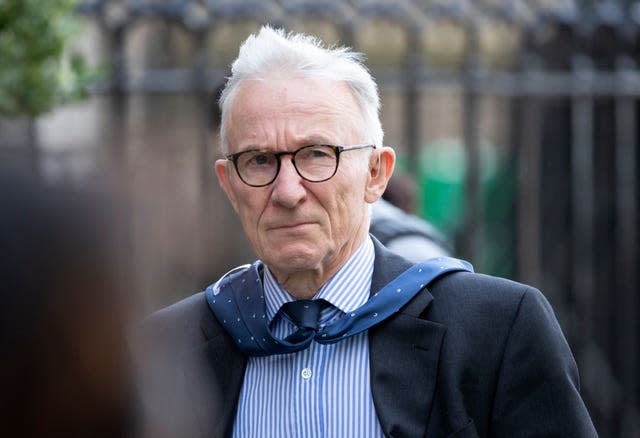Hospitals inquiry chairman to rule on admission of health board’s report
The chairman of a public inquiry into safety and wellbeing issues at two Scottish hospitals said he will make a decision “later in the week” on whether to admit as evidence an expert report from one of the health boards involved in the scandal.
The inquiry was launched in the wake of deaths linked to infections at the Queen Elizabeth University Hospital in Glasgow, including that of 10-year-old Milly Main.
It is also examining problems that led to the delay in the opening of the new Royal Hospital for Children and Young People in Edinburgh.
At a hearing in Edinburgh on Tuesday, lawyers representing a number of parties to the inquiry called on chairman Lord Brodie KC not to admit the report from NHS Greater Glasgow and Clyde (NHSGGC) as evidence, ahead of hearings scheduled to start on August 19.
Counsel to the inquiry Fred Mackintosh KC said the report “appears to reach the significant conclusion that there were no excess infections in the hospital after 2015”, which, he said, seems to contradict the views of many others.
Mr Mackintosh also raised concerns about the level of co-operation with the inquiry by NHSGGC, saying the report contained a “major epidemiological study” the inquiry was unaware was being undertaken, and the inquiry had not been provided with all the data supporting the report’s findings.
He also said the report had not addressed the question of whether there were any issues with “key building systems” including water supply and ventilation, which are a central focus of the inquiry.
Concerns were also raised by a number of lawyers that the submission of an “expansive” report just three weeks ahead of the hearings gave them very little time to consider it properly without proceedings being delayed, and that it placed a “considerable burden” on inquiry participants.
Helen Watts KC, representing three infection control doctors employed by NHS Glasgow, said her clients work full-time and will struggle to find the time alongside their work to produce detailed responses to the report in the next three weeks.
The approach taken by NHSGGC is, she said, “lacking in both candour and courtesy to the inquiry and all of those who participate in it”.
Lawyers representing affected patients and their families also asked why the health board had only now chosen to issue the report, which it had commissioned in November 2022.
Steven Love KC, described his clients’ “distress, upset and anger” about the fact the report was appearing “at this very late stage”, and said those he represents have already been waiting years for answers and are worried this will delay the inquiry’s final report.

“They ask, I think with some justification, why is this happening now, three weeks before the commencement of the scheduled hearings?” he said.
“Why did a report of this nature not materialise years ago, when patients and families were being affected by the ongoing problems and infection issues at the hospital?”
Clare Connelly, representing two affected families, also questioned the motivation behind the report.
She suggested it was “adversarial” rather than “inquisitorial” in nature, and that it had been produced in order to “undermine the expert reports that are already before the inquiry”.
She pointed to the fact the report questioned evidence obtained from a case notes review from March 2021, and the fact the letters of instruction given to the three medical experts commissioned to produce the report said it would be relied on in civil and criminal proceedings as well as the public inquiry.
Ms Connelly told the hearing that is not “in the spirit of a public inquiry, and it’s not the course of action of core participants who are seeking to assist the inquiry”.
Responding to the criticisms of the report, Peter Gray KC, representing NHSGGC, rebutted the suggestion that his client had at any time failed to act in a transparent and collaborative way towards the inquiry, and rejected the idea it had taken an adversarial approach.
“Since the inception of the inquiry, NHSGGC and those acting on its behalf have co-operated with the inquiry to the fullest extent at all times and have adopted a wholly collaborative approach,” he said.
He also said it was “unfortunate” the report was only now being made available, but said it had been produced “as quickly as reasonable practicable” given the volume of data collected and how busy its authors had been.
He called on Lord Brodie to admit the expert report, saying it is necessary to balance the criticism of NHSGGC in reports from the inquiry’s experts, which, he said, risk undermining public confidence in the hospitals.
He also said the report would assist in the inquiry’s consideration of whether the hospitals provided “a suitable environment for the delivery of safe healthcare for their patients”.
He said: “In my submission, the NHSGGC report offers a useful and significant contribution to those considerations.
“For the inquiry to proceed without the report from NHSGGC being properly placed in evidence, there is in my submission a material risk that public confidence in both hospitals will be damaged irreparably and needlessly.”
The inquiry is set to resume on August 19.


